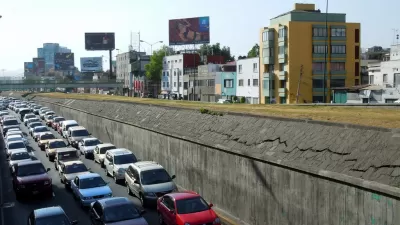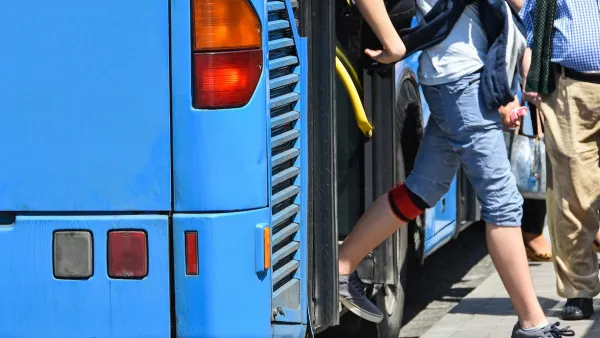Mexico City's emergence as a "commuter's paradise" due to a focus on people and places, rather than cars and driving, has earned the city this year's Sustainable Transport Award from the Institute for Transportation and Development Policy (ITDP).

Josie Garthwaite details how the Mexican capital's embrace of bicycles, pedestrian-friendly plazas and walkways, new bus lines, and parking meters (?), has transformed it from commuter hell to paradise in just a couple of years.
"'They really changed quite fundamentally the direction and vision of the city, and a lot of it was in 2012,' said Walter Hook, chief executive of ITDP, an international nonprofit that works with cities to reduce greenhouse gas emissions and improve quality of urban life."
"Since 2011," explains Garthwaite, "Mexico City has added two new bus corridors to its Metrobus system, connecting the narrow streets in the historic center to the airport and making it the longest bus rapid transit (BRT) system in Latin America. The city also added nearly 90 stations and 1,200 new bicycles to the Ecobici bike-sharing program, began to reform on-street parking, improved sidewalks, and established new walkways. Cars were removed entirely from some narrow streets to make room for free flow of buses and pedestrians, and marketplaces were established for street vendors to help unclog the corridors."
And about those parking meters? "The new parking system, called ecoParq, introduced multispace meters to thousands of parking spots on streets where parking previously had been free—officially free, anyway." Although the unregulated valets or attendants known as franeleros, who controlled much of the city's on-street parking, protested the changes, "ecoParq has proven to be popular among many residents," notes Garthwaite.
FULL STORY: Bikes and Buses Propel Mexico City to Prize in Sustainable Transport

Maui's Vacation Rental Debate Turns Ugly
Verbal attacks, misinformation campaigns and fistfights plague a high-stakes debate to convert thousands of vacation rentals into long-term housing.

Planetizen Federal Action Tracker
A weekly monitor of how Trump’s orders and actions are impacting planners and planning in America.

In Urban Planning, AI Prompting Could be the New Design Thinking
Creativity has long been key to great urban design. What if we see AI as our new creative partner?

Massachusetts Budget Helps Close MBTA Budget Gap
The budget signed by Gov. Maura Healey includes $470 million in MBTA funding for the next fiscal year.

Milwaukee Launches Vision Zero Plan
Seven years after the city signed its Complete Streets Policy, the city is doubling down on its efforts to eliminate traffic deaths.

Portland Raises Parking Fees to Pay for Street Maintenance
The city is struggling to bridge a massive budget gap at the Bureau of Transportation, which largely depleted its reserves during the Civd-19 pandemic.
Urban Design for Planners 1: Software Tools
This six-course series explores essential urban design concepts using open source software and equips planners with the tools they need to participate fully in the urban design process.
Planning for Universal Design
Learn the tools for implementing Universal Design in planning regulations.
Gallatin County Department of Planning & Community Development
Heyer Gruel & Associates PA
JM Goldson LLC
City of Camden Redevelopment Agency
City of Astoria
Transportation Research & Education Center (TREC) at Portland State University
Jefferson Parish Government
Camden Redevelopment Agency
City of Claremont




























